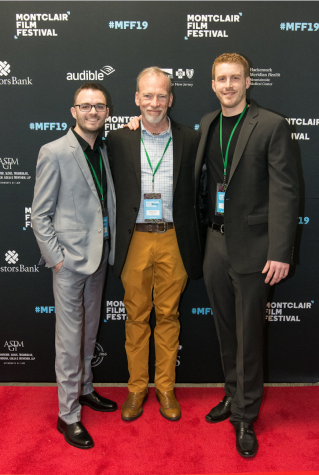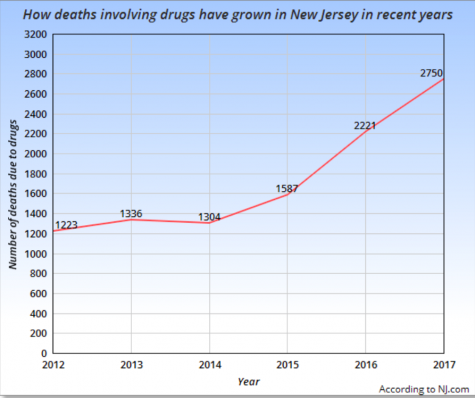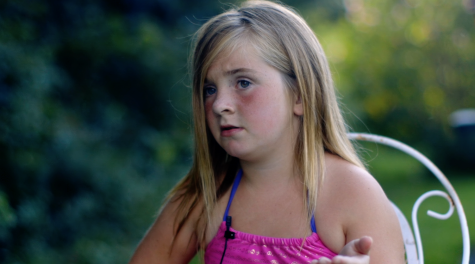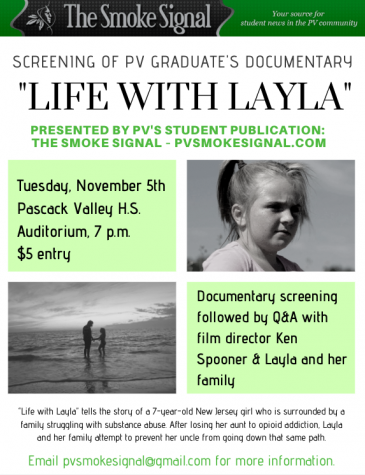Behind the scenes with NJ filmmaker
PV alum creates film about a family's struggle with substance abuse
November 1, 2019
The Smoke Signal will be sponsoring a screening of Pascack Valley 2008 alum Ken Spooner’s 2019 documentary “Life with Layla” as a fundraiser for the film to gain a national audience. The documentary will be shown in the PV auditorium on Tuesday, Nov. 5, at 7 p.m. Entry is $5, and Spooner, who co-directed and co-produced the film, along with Layla will be on hand with his associates for a Q & A following the screening.
“Just to go back to Pascack Valley and screen this for the students and faculty is a big thing for me personally because this is my alma mater — this is where I grew up, this is my school,” Spooner said.
Spooner hopes to help someone within PV’s community, even if it is just one person struggling with opioid addiction.
Started off as ‘just a hobby’

Mike Mee (left), Steve McCarthy (center), and Ken Spooner (right) presented their documentary “Life with Layla” at the Montclair Film Festival this May.
When Pascack Valley 2008 graduate and filmmaker Spooner was a senior, he enrolled in the video production class. He only took the class because he “thought it would be easy,” but filmmaking would become much more than “just a hobby” a few years later.
“[My teacher] put the camera in my hand and I really enjoyed doing it,” Spooner said. “Once I picked up the camera, I never put it down.”
Although he took a filmmaking class in high school, going into college, Spooner’s only focus was playing basketball. He attended Cazenovia College in upstate New York near Syracuse for half a semester before he contracted infectious mononucleosis and transferred to Montclair State University. Spooner’s mom, Mary Spooner, helped him in pursuing filmmaking and video production while at Montclair State.
“She pushed me into going into the broadcasting department,” Spooner said. “She made me send a letter and apply, and without her pushing me to do something like that, I wouldn’t have gone there.”
Spooner’s mom, Mary Spooner, said that she noticed Spooner’s interest in making films during his last year at PV.
“I saw a spark and I saw a talent,” she said. “Every time he had a camera, I saw that he had a passion.”
Spooner said that Montclair State shaped who he is today and the career that he has pursued. While at college, Spooner was able to meet his current mentor and producer of “Life with Layla,” Steve McCarthy. McCarthy provided Spooner with opportunities, including traveling to Austria and Italy, to help him gain credit in the filmmaking industry before he graduated from college.
“He took me overseas to shoot my first feature-length documentary, ‘American Voices,’ which aired on Channel 8 before I graduated,” Spooner said. “Steve taught me everything I know about telling stories.”
Spooner also met the co-producer and co-director of the film, Mike Mee, in a college film class. During his senior year, Spooner, Mee, and McCarthy went to the Kingdom of Jordan to film a documentary.
“That was our first trip where we had a chance to bond and form a friendship,” Spooner said. “Mike’s my best friend now, and it’s a lot of fun making a film with your best friend. There’s nothing like it.”
Since then, Spooner has gained more experience in the film industry. Over the course of his career, he has learned that there is no shame in asking for help.
“As a filmmaker, you really have to tell stories that you want to tell and you have to be persistent,” Spooner said. “You can’t take no for an answer. You just have to put one foot in front of another.”
The purpose of the film
According to the New Jersey Department of Law and Safety, there have been 2,703,323 opioids prescribed and 1,928 overdose deaths in the state from January 1 to August 31, 2019. In Bergen County alone, there have been 232,362 opioid prescriptions and 101 overdose deaths in the same timeframe.
“Life with Layla” is a documentary directed and produced by Spooner and Mee, and produced by McCarthy. The film follows 7-year-old Layla from Sussex County, who has recently lost her Aunt Melissa to addiction. With her family history filled with substance abuse, Layla’s uncle, Greg, struggles with heroin use in the film.
“We wanted to show how [addiction] trickles down to the family and affects the family members around the addict,” Spooner said. “It trickles down to children as well.”
Many people in New Jersey have been affected by the opioid epidemic. Spooner’s mom said that he has lost multiple people to opioid addiction, many of whom went to grade school with him.
“He lost several friends through the epidemic,” she said. “It was almost in their honor that he wanted to do something. Sadly, [hearing about someone overdosing] is really not that unusual.”
Mee said that he had been aware that addiction was happening all around him. He said it was as if every few months, he would hear about someone in his town or the high school he attended was struggling with addiction.
“I was interested in the topic of addiction to begin with because it was happening so much,” Mee said. “Once we really started filming with [the Borras] family, we learned that they were amazing people and humans just like any of us, whether we are addicted or not.”
Spooner, McCarthy, and Mee wanted to ensure that the film would educate others on addiction and the struggle that addicts face.

“All of these addicts are people,” McCarthy said. “Brothers and sisters, aunts and uncles, you can’t lose sight of that. They may be going through some difficult times but they’re humans. We have to continue to have a passion for them.”
Spooner said that Layla and her mom, Cait Borras, try to spread awareness about addiction in their community.
“Layla posts videos on Instagram about how people need to wake up and teach their children about addiction and not hide it,” Spooner said. “The last thing we can do is pretend it doesn’t exist because that stigma is going to make it worse.”
Spooner hopes to acquire distribution and hopefully get the documentary screened nationwide in various different schools. He wants to reach a larger audience in order to help others who might be struggling with substance abuse. Mee also said that change starts by informing the youth and making sure they are educated on the matter.
“Hopefully this film can help someone within our small community, even if it’s just one person,” Spooner said.
The filming process
Spooner first met Layla when they interviewed her at 6 years old. While they were unable to fit the interview footage into the documentary, he used the experience to form a relationship with her over the next three years that would be crucial to the success of the film.
“We sat [Layla] down the first time and we asked her super easy questions,” Spooner said. “She sat right in front of the camera and she loved it. One of the lines from her first interview was ‘I’m a movie star’ and she smiled at the camera with no teeth.”

The Borras family spreads awareness about substance abuse by giving speeches and posting on social media.
Spooner started filming with the Borras family in August of 2015 and finished up their last interview with Layla in the spring of 2018, saying that watching Layla grow up has been incredible.
“What began as a bigger, broader topic on heroin and opioid addiction, ended up narrowing down and focusing on Layla’s family,” Mee said. “We thought it would be important to show this as a family issue because everyone is going through it. Rather than just listening to talking heads just spit facts at you about heroin addiction, we wanted to show it through the eyes of a child.”
According to Spooner, countless films have been produced on the topic of addiction. Layla makes our film unique because the story is told through her eyes.
“Working with a child, you have to show them that the camera is not just an object, it’s a part of who I am,” Spooner said. “Putting the camera in [Layla’s] hands and letting her play with it is really important so then she gets used to the whole thing.”

PV alum Ken Spooner co-directed and co-produced 2019 documentary “Life with Layla.”
The first scene that Spooner and Mee filmed was in a hotel room in Elizabeth where they met with Cait Borras and Greg Borras for the first time. In this scene, Greg injected heroin in front of the camera which Spooner described to be an “eye-opening” experience.
“Cait and Greg were in one of the most vulnerable moments in their life after the passing of their sister, so this is really raw and emotional stuff,” Spooner said. “Willing to sit down takes a lot of strength on their end, and to be open to telling a story.”
Spooner said that he and Mike tried to stay objective throughout filming and avoid emotions which they find to be very important as filmmakers.
“These interviews where we sat down with them were therapy sessions,” Spooner said. “They were able to sit down and talk about it, and that’s really important in the grieving process is being able to talk to somebody.”
